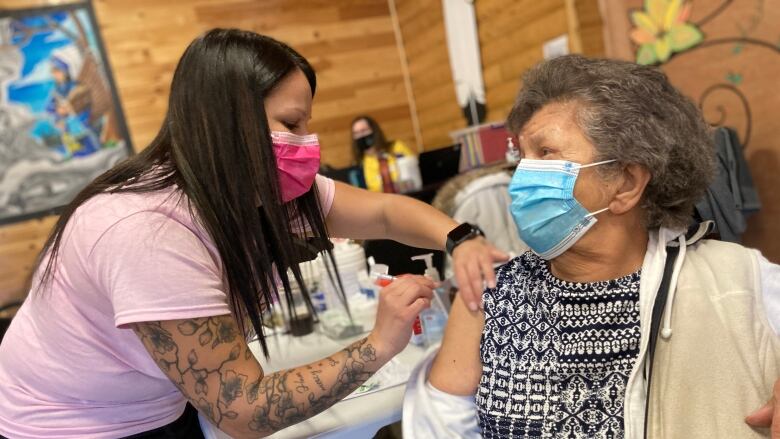COVID-19 in Indigenous communities: What you need to know this week
18 new deaths from the virus reported in First Nations communities

The number of active cases of COVID-19 in First Nations and Inuit communities is continuing on a downward trend, according to the latest data from Indigenous Services Canada.
There were 1,223active cases in First Nations communities as of March 8.As of March 5, the federal department reported six active cases in the Nunavik region of Quebec and there were23 active cases in Arviat, Nunavut, as of March 8.
New infections persist, with the most occurring in Ontario as357 new cases on-reserve were reported in the last week.
Since the pandemic began, there have been a total of 22,368 cases in First Nations communities. A total of 248 people have died from the virus, 18 reported in the last week. The total number of hospitalizations rose to 1,021. The number of First Nations people who have recovered from the disease is now at 20,897.
Total cases in First Nations communities per region reported as of March 8:
- British Columbia: 2,435
- Alberta: 6,558
- Saskatchewan: 5,880
- Manitoba: 5,557
- Ontario: 1,364
- Quebec: 564
- Atlantic: 10
Vaccine distribution
According to a March 5 update from the federal department, more than 127,000 doses of vaccine have been administered thus far, representing approximately 40 per cent of the population in First Nations, Inuit, and territorial communities having received at least one dose.
Read moreabout the vaccination clinics that recently took place in Tobique First Nation, N.B.,Musqueam First Nation, B.C., as well asKahnawake, Que.:
- 91-year-old among first in line as Tobique First Nation welcomes vaccine clinic
- Most vulnerable in Kahnawake receive COVID-19 vaccine as community campaign begins
- Confusion about First Nations access to vaccine persists as B.C. rollout continues
Immunization teams in Manitoba will visit First Nations in the province in mid-March to vaccinate entire communities at once, with those at most risk of flooding and fires or losing winter road access prioritized.
Watch 90-year-old Waris:se Myrtle Bush receive her shot in Kahnawake, Que., on March 4.
What are the symptoms of COVID-19?
- New or worsening cough.
- Shortness of breath or difficulty breathing.
- Temperature equal to or over 38 C.
- Feeling feverish.
- Chills.
- Fatigue or weakness.
- Muscle or body aches.
- New loss of smell or taste.
- Headache.
- Gastrointestinal symptoms (abdominal pain, diarrhea, vomiting).
- Feeling very unwell.
If you think you may have COVID-19, please consult your local health department to book an appointment at a screening clinic.
CBC Indigenous is looking to hear from First Nations, Mtis, and Inuit who have contracted or lost a loved one to COVID-19. If you would like to share your story, please email us at indigenous@cbc.ca.














_(720p).jpg)


 OFFICIAL HD MUSIC VIDEO.jpg)
.jpg)



























































































